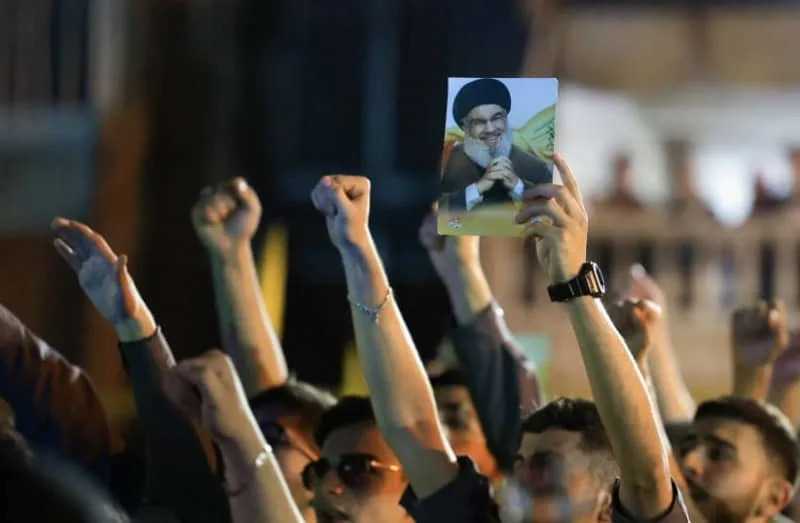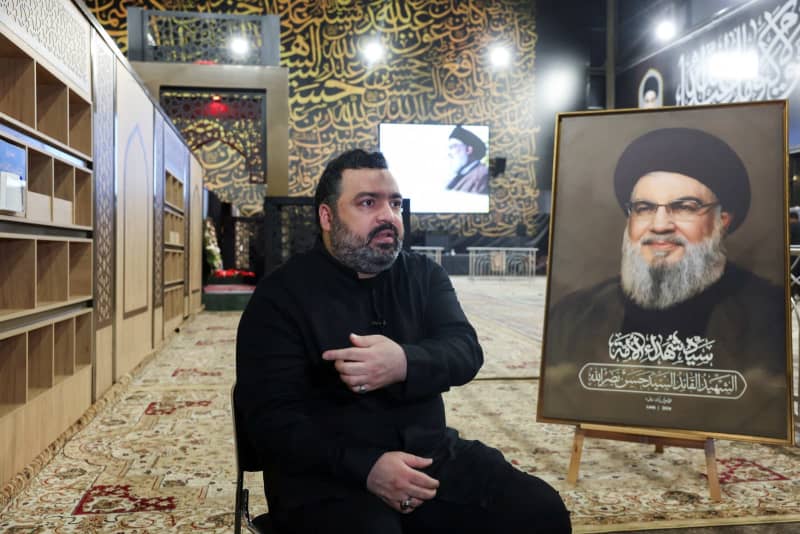Hezbollah’s leader, Secretary-General Sheikh Naim Qassem, believed that disarmament means disarming forces in response to Israel’s demands and to achieve its goals.
Hezbollah continues to cling on in Lebanon. Although it has lost many fighters and part of its arsenal, the group believes that it can outlast pressure on it to disarm.
An example of how the group is clinging on can be seen in recent reports from Beirut. For instance, Hezbollah projected a giant image of its late leaders on the Raouché Rock natural landmark. This incident has continued to befuddle Lebanon’s President Joseph Aoun and Prime Minister Nawaf Salam. The fact that the president and prime minister don’t know what to do after the incident reveals that they are having trouble confronting Hezbollah.
Al-Akhbar, which is generally pro-Hezbollah, noted, Aoun and Salam “discussed ways to address the events in Raouché after Salam objected to the illumination of the rock with images of the two martyred Hezbollah secretary-generals, Sayyed Hassan Nasrallah and Hashem Safieddine.”
Hezbollah faces challenges
A second article looked at what challenges Hezbollah faces in Lebanon. “A year after the war, Hezbollah faces a set of challenges that will determine the course of the next phase. These challenges are no longer limited to the effects of the recent confrontation or its economic and political repercussions, but have become part of a broader battle to redefine the party’s position domestically and regionally.”
What does Hezbollah think? The article noted that “the most significant challenge facing Hezbollah today is no longer confined to the wounds of the recent war or its economic and political repercussions. Rather, it embodies a deeper battle: one that implicitly aims to rebuild the deterrence system, especially since the current situation has devolved into a state of stagnation and attrition, with the enemy taking advantage of the margin of freedom of movement to carry out intermittent strikes and targeting.”

Hezbollah’s leader, Secretary-General Sheikh Naim Qassem, believed that disarmament means disarming forces in response to Israel’s demands and to achieve its goals. He called on the government to place national sovereignty at the top of its agenda.
In another series of comments, Hezbollah has said it will not give up its weapons. This is clearly designed to confront US pressure and Beirut’s policy aimed at stripping Hezbollah of its arsenal. At the same time, other parties in Lebanon want the state to have a monopoly on weapons, rather than have Hezbollah operate an army within the state.
“Free Patriotic Movement leader MP Gebran Bassil said weapons should be exclusively reserved for the Lebanese Army to protect Lebanon and its borders, warning against pitting the military against its own people,” Al-Akhbar notes.
Hezbollah continues to receive support from abroad, at least rhetorical support. The Houthis in Lebanon have said that Lebanon should keep its arms. The Houthis are backed by Iran. “The leader of the Ansar Allah movement, Sayyed Abdul-Malik al-Houthi, stated that ‘the weapons possessed by Hezbollah pose a problem for Israel and an obstacle to its occupation of Lebanon, as do the weapons held by mujahideen in the Gaza Strip.’ He asserted that “the issue of weapons possession should not be a problem for the nation, so that Arab regimes would rush to adopt Israeli and American dictates,” Al-Akhbar noted.
The recent articles all make it clear that there is a full-court press by Hezbollah and its backers to maintain the status quo in Lebanon. Even though the group is weakened, it wants to slowly claw its way back to its old position in the country.

